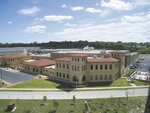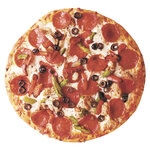


MILWAUKEE, Wis. — Selling more than 100 million pizzas annually under five brands, Palermo’s is a big name in the frozen pizza aisle.
“We have multiple product lines sold nationwide through most retailers people would recognize today,” said Nicholas Fallucca, who is the third generation in his family to run Palermo’s.
Palermo’s makes well over 100 varieties of pizza, and every Palermo’s brand contains different sauces, meats and crust styles. Palermo’s is the fourth largest frozen pizza brand in the U.S., Fallucca said, but the third biggest pizza producer due to its work with private brands. Palermo’s also makes private-label pizzas on an international basis.
At the core of Palermo’s creations are flour, tomatoes and dairy. With cheese as the foundation of every pizza, the company is a massive consumer of this dairy product. Palermo’s uses approximately 50 million pounds of cheese per year.
“Who wants a pizza without cheese?” Fallucca said. “Every single one of our pizzas uses cheese. We wouldn’t be where we are without the dairy industry — the farmers making milk and the processors making cheese for us. I tip my hat to them.”
From parmesan to mozzarella and ricotta, white cheddar provolone to feta and goat cheese, Palermo’s uses a combination of hard and soft cheeses.
“We like soft cheeses for their flavor and meltability, while hard cheeses like parmesan and Romano provide nice salt,” Fallucca said. “Provolone is great for sharpness. We use different blends of cheeses to achieve what we want.”
Palermo’s likes to experiment with cheese and go where no pizza brand has gone before.
“We were one of the first companies to use fresh mozzarella on a frozen pizza,” Fallucca said.
Palermo’s expertise in pizza making traces back to Fallucca’s grandfather, Jack Fallucca. Jack and his wife, Zina, started Palermo’s in 1964 after emigrating from Italy in the 1950s. Palermo’s was named after the town where they grew up in Sicily. In 1964, the couple opened a bakery, and in 1969, they opened a restaurant serving traditional handmade favorites like chicken parmesan and lasagna.
The Falluccas also served French bread pizza at the bar while customers waited for a table. When Jack entered the frozen pizza market in 1979, he left all other food behind to pursue a new passion — a 12-inch thin-crust pizza made from scratch.
“Everything was made by hand,” Fallucca said. “He cut his own vegetables and made his own sauces. We still make a lot of our own crust and dough today.”
By the late 1980s, Palermo’s had grown through private-label pizza.
“Safeway took a chance on us,” Fallucca said. “Since then, we’ve been focusing on our core values of making a great product, treating our employees well and providing great customer service. Those three things are who we are today.”
In 2003, Palermo’s Primo Thin pizza received nationwide distribution through Costco.
“That was the first big deal for us,” Fallucca said.
Palermo’s expanded into other brands of pizza when they launched Screamin’ Sicilian in 2014.
“This craft pizza is different from everything else,” Fallucca said. “It’s flavor-forward, bold and has lots of ingredients. Screamin’ Sicilian is our most popular brand. Every Palermo’s brand stands for something different and has a unique message, tone and voice.”
Attempting to reach a different audience, Screamin’ Sicilian is sold at a higher price point and features attention-grabbing names like Mother of Meat, Supremus Maximus, Bessie’s Revenge and Holy Pepperoni.
“We put years into developing and marketing this brand,” Fallucca said. “It’s a long-term, sustainable brand to grow and invest in and push the envelope of what’s possible.”
Other brands under Palermo’s include Urban Pie, Connie’s Pizza and Surfer Boy Pizza. Inspired by the pizzeria featured in the television show, “Stranger Things,” Surfer Boy Pizza is a partnership with Netflix and Walmart.
“We couldn’t even keep it on the shelf when it first came out,” Fallucca said. “This was an amazing project that allowed us to showcase our abilities to develop and commercialize a new item.”
Fallucca described Urban Pie as a culinary experience featuring all-natural, spicy flavors that attract sophisticated foodie types. Loaded with mozzarella, provolone, gouda, parmesan, Romano, Asiago, white cheddar and fontina, Fallucca said it is one of their most unique pizzas.
“We use a lot of Wisconsin cheese and are also working with a local dairy farmer who makes cheese for us,” Fallucca said. “Cheese is a very important part of pizza, and we have to have different sources.”
As a result, Palermo’s goes through a request for proposal process on cheese every few years.
“Cheese has to be a certain quality,” Fallucca said. “If it doesn’t meet our expectations, we’re not even going to consider it. Also, with the amount of cheese we use, we need a good source. We can’t run out.”
Selecting the right cheeses for frozen pizza production is anything but easy.
“There are so many aspects of a good cheese, such as how it manufactures, its age, and fat and salt content,” Fallucca said. “It might be a great cheese for a pizzeria but not for pizza production.”
Factors like these are crucial to how a cheese performs and how it tastes when it is fresh versus baked.
“There’s a sweet spot between manufacturing and eatability, and that’s why having a great cheese is so important to us,” Fallucca said. “We’re very finicky and work with our cheese suppliers to make sure we have the right cheese for manufacturing.”
Palermo’s makes its sauces in-house, and meats like pepperoni and salami are sliced fresh. Palermo’s shreds most of its cheese from blocks. After they are topped, pizzas enter a blast freezer before being packaged. Palermo’s pizzas have a nine-month shelf life.
“Our process is highly automated,” Fallucca said. “But we do have different crust styles, and those are done manually.”
Serving as a reflection of the Fallucca family’s Italian heritage, the pizza is made in a building resembling an Italian villa — complete with a courtyard and waterfalls. The facility includes four manufacturing lines and three bakeries. Palermo’s also has a manufacturing facility in Jefferson with two topping lines.
The company has nearly 1,200 employees between the two locations, and Fallucca said it is their employees that make Palermo’s unique.
“Our employees are second to none,” he said. “We couldn’t do anything we do without them. They come here every day to make pizza and are out in stores selling it. They’re the culture.”
Committed to craftsmanship and ingredients, Palermo’s offers an attractive alternative to ordering in or going out for pizza.
“Our mission is to deliver a great pizza experience,” Fallucca said. “We want to make sure we’re always evolving.”
Comments
No comments on this item Please log in to comment by clicking here